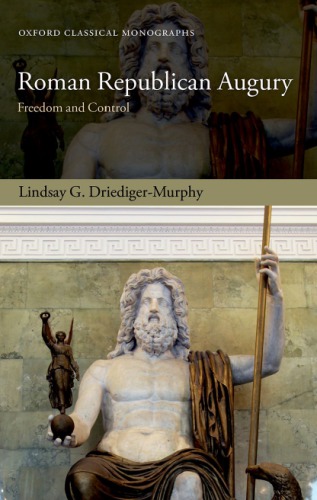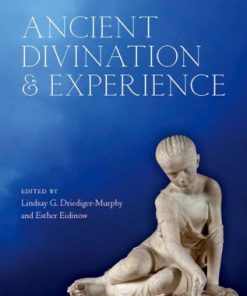Roman Republican Augury: Freedom and Control 1st Edition Lindsay G. Driediger-Murphy
$50.00 Original price was: $50.00.$25.00Current price is: $25.00.
Roman Republican Augury: Freedom and Control 1st Edition – Ebook Instant Download/Delivery ISBN(s): 9780198834434,0198834438,9780192571281, 0192571281

Product details:
- ISBN 10: 0192571281
- ISBN 13: 9780192571281
- Author: Lindsay G. Driediger-Murphy
Roman Republican Augury: Freedom and Control proposes a new way of understanding augury, a form of Roman state divination designed to consult the god Jupiter. Previous scholarly studies of augury have tended to focus either upon its legal-constitutional aspects (especially its place in defining, structuring, and circumscribing the precise constitutional powers of magistrates), or upon its role in maintaining and perpetuating Roman social and political structures (primarily as a tool of the elite). This volume makes a new and original contribution to the study of Roman religion, theology, politics, and cultural history by challenging the prevailing view that official divination was organized to produce only the results its users wanted, and focusing instead upon what it can tell us about how the Romans understood their relationship with their gods. Rather than supposing that augury, like other forms of Roman public divination, told Romans what they wanted to hear, it argues that augury in both theory and practice left space for perceived expressions of divine will which contradicted human wishes, and that its rules and precepts did not allow human beings simply to create or ignore signs at will. Analysis of the historical evidence for Romans receiving, and heeding, signs which would seem to have conflicted with their own desires allows the Jupiter whom they approached in augury to emerge as not simply a source of power to be tapped and channelled to human ends, but as a person with his own interests and desires, which did not always overlap with those of his human enquirers. When human and divine will clashed, it was the will of Jupiter, not that of the man consulting him, which was supposed to prevail. In theory as in practice, it was the Romans, not their supreme god, who were ‘bound’ by the auguries and auspices.
Table of contents:
- 0.1. Of Gods and Men
- 0.2. Why Now?
- 0.3. What Is Needed?
- 0.4. How? Four Guiding Principles
- 1. Do As I Say, Not As I Do? Report versus Reality in Augury
- 1.1. Introduction
- 1.2. Prin ciple 1 in the High and Late Empire: Comments on Signification
- 1.3. Principle 1 in the High and Late Empire: Claims that Augural Rules Gave Humans the Freedom to Accept or Reject Signs
- 1.4. Principle 1 in the Middle (and Late) Republic: Claims that Human Awareness of Signs Determined their Validity
- 1.5. Principle 2 in the Early Principate: The Claim that Augural Rules Gave Humans Freedom to ‘Create’ Signs by Reporting Them
- 1.6. Principle 2 in the Late Republic: The Claim that Humans Contrived Auspication so as to Receive Favourable Signs and Avoid Receiving Unfavourable Ones
- 1.7. Conclusions
- 2. Convenience or Conversation? Why ‘Watching the Sky’ Was More than Wishful Thinking
- 2.1. Introduction
- 2.2. What Was Sky-Watching?
- 2.3. Did Sky-Watching Invariably Produce Signs?
- 2.4. Was Sky-Watching Technically Sufficient to Prohibit Assemblies?
- 2.5. Possible Objections: The Timing of Servare de Caelo
- 2.6. But Would It Actually Work?
- 1. Contemporary References
- 2. Later References
- 3. Other References to Delay Caused by Bibulus (how not stated)
- 4. Other References to Bibulus’ Opposition and Attacks on him (no mention of sky-watching)
- 5. Other References to Doubts about the Validity of Caesar’s Legislation (auspices not mentioned)
- 3. Out of Control? The Effects of Augury on Roman Public Life
- 3.1. Introduction
- 3.2. Motives, Part 1: Cicero, the Augurium Salutis, and the Limits of our Knowledge
- 3.3. Motives, Part 2: Two Methodological Problems and Two Abdicating Consuls
- 3.4. Motives, Part 3: The Consul, his Colleague, a Tribune, and Roman Respect for Augury
- 3.5. The Dynamics of State Divination
- 3.6. But Did It Really Matter?
- 3.7. Conclusion: When Signs Said No
People also search:
You may also like…
Politics & Philosophy - Anthropology
Freedom, Indeterminism, and Fallibilism 1st Edition Danny Frederick
History - World History
Politics & Philosophy
Politics & Philosophy - Social Sciences
Tabloid Journalism and Press Freedom in Africa 1st ed. Edition Brian Chama
Politics & Philosophy - Social Sciences
Hegel, Marx, and the Necessity and Freedom Dialectic 1st ed. Edition Russell Rockwell
Politics & Philosophy
Republican Orators from Eisenhower to Trump 1st Edition Andrew S. Crines
Business & Economics
Romance - Contemporary Romance












